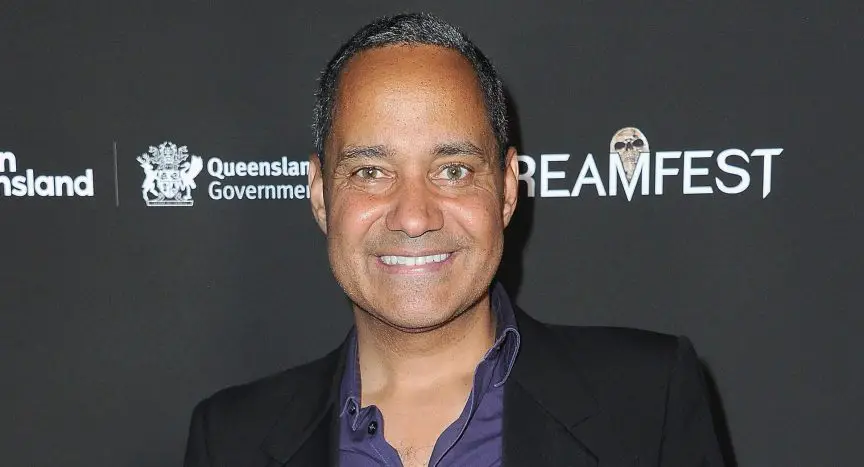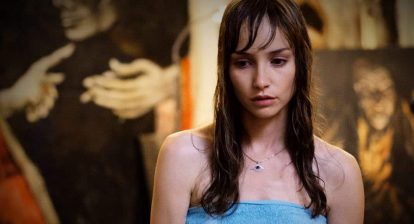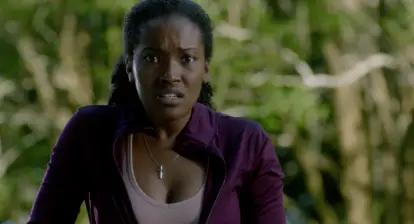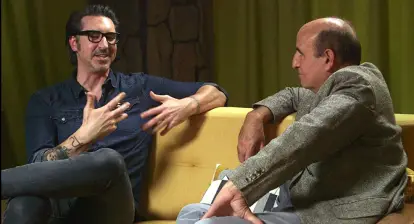The name Jeffrey Reddick has become synonymous with the Final Destination franchise, which is fair enough considering the prolific actor, producer, writer, and lifelong horror fan gave birth to the Death-stalking mega-hit, penning the original film as well as 2016’s Dead Awake and 2018’s The Final Wish. Now, though, Reddick is ready to make his mark as a director with his long-awaited debut feature, Don’t Look Back.
The movie sees a group of bad Samaritans stalked and picked off one by one by an unseen malevolent force after failing to intervene upon witnessing a violent crime taking place in broad daylight. Up-and-coming Black actress Kourtney Bell gives an impassioned performance as the troubled lead Caitlin, whose PTSD over her father’s recent murder may or may not be interfering with her perception of reality.
Related: Jeffrey Reddick’s Don’t Look Back is an Impressively Spooky Debut [Review]
Don’t Look Back is a spooky, well-performed, and impressively taut exercise in sustained tension that marks Reddick out as a major talent behind the camera, as well as on the page. Wicked Horror caught up with him to talk real-world horrors, typecasting in Hollywood, the joy of shooting down south, and plenty more besides.
WICKED HORROR: Where did the idea for Don’t Look Back originally come from?
JEFFREY REDDICK: The kernel of the idea came from a story that’s always stuck with me, about a woman named Kitty Genovese who, in New York, I think it was in the sixties, was assaulted in her courtyard, and the story that came out to the world was that 30 or 40 people witnessed it and didn’t call for help. Her story always stuck with me and then, I found out later, actually when I was location scouting for Don’t Look Back, there was a documentary on Netflix about her and it turned out that the story wasn’t quite true. People didn’t help in time but they weren’t as cold as the urban legend had made them out to be. But that story really stuck with me, about how somebody could not help somebody when they were in distress, and it also made me think about what I, personally, would do in that kind of situation. That happens to me a lot, I’ll get an idea or have a story that sticks with me for years and I’m just trying to figure out the right way to tell it in a screenplay. Anyway, I decided to use that as an inciting incident, so that we could really get into the guilt that comes along with that and why people don’t help, and are you as guilty if you don’t help as the person actually doing something bad.
WICKED HORROR: Right, like, are you complicit yourself?
JEFFREY REDDICK: Exactly. On that note, I didn’t want the crime to be too crazy. You don’t expect people to jump in and start physically attacking the guy that’s attacking Douglas but nobody even calls for help, or even yells out “stop!” [laughs] They don’t do anything, so it was that kind of guilt I wanted to play with. And it’s just gotten worse in the last few years, when people see something horrible happening, their first instinct is to pull out their phones and film it and they don’t even call 911. Like, at least call 911. It’s really sad, I think, and I don’t know whether it’s a unique problem here in the U.S. – it feels like it is here especially –but it might be everywhere. It just feels like here, everybody is so quick to pull out their cell phones because they want their 15 minutes of fame.
WICKED HORROR: It’s hard, too, because the appetite for that kind of morbid content is so voracious right now. I had a friend who was working with somebody who asked him whether he ever watched snuff movies, because he knew he was a horror fan. And he was like “no…what’s the connection there!?”
JEFFREY REDDICK: There’s no connection there! [laughs]
WICKED HORROR: That actually brings me to the footage that starts off the movie. Is that real footage? ‘Cause it looks super real, which is sadder in a way.
JEFFREY REDDICK: It’s all real. I wanted to start the movie out with real footage. Obviously, there are rights issues and clearance issues, we had to clear all the clips that we used, but yeah, those were real clips.
WICKED HORROR: Eek. So, what was the hardest part of getting Don’t Look Back from the stage to the screen in general?
JEFFREY REDDICK: It’s been a journey, like every film. With every film that gets made, there’s such a long journey behind it. There were so many times when this project was going to get picked up as a script and somebody else was going to direct it and then we got to the point where a studio was going to finance it with me directing it and we cast it, we found all the locations, we were ready to go, and then we came back from location scouting and they were just like “we’re shutting down our feature department.” That was like a year that we lost because I’d blocked out the rest of the summer, ‘cause I was supposed to be shooting, and I turned down a lot of work as a result, so after that happened with the studio my producer Andrew van den Houten, who’s been with the project for so long, the two of us just decided we were going to do it independently. We were like, let’s just do it, because we can’t keep waiting around for other people to do it for us. So we decided to just go the indie route and just shoot it ourselves.
WICKED HORROR: Did you have any trouble insisting on casting a Black, female lead? Was that a stumbling block for you guys along the way?
JEFFREY REDDICK: Not once we went independent, because Andrew told me I could cast whoever I want. For me, I do like to have a conversation about this because I think it’s great that Hollywood is now focusing more on having diversity in their stuff, especially in genre films, where we desperately need it, but I think that what gets lost… When you talk about diversity, certain people have a kneejerk reaction about it, and I think that what gets lost with people is – and this is the same in businesses in general – I started out acting in the early nineties, I moved to New York, and there was no diversity in casting. My agent told me that I was an “ethnic Michael J. Fox type” and he was huge at the time and I love him so I was like “oh that’s great,” but she told me “no, because they don’t write roles for ethnic Michael J. Fox types. If you rapped or played basketball I could cast you.” But that was the sad reality, through a lot of the nineties, if you were a person of color, the only roles you could play were prostitutes, pimps, basketball players, or rappers. That was it. When people say “oh, we just cast the best person for the role,” people who aren’t in the industry don’t understand that when we send out a casting notice for a lead actor or actress, in any kind of film, we have to put “open to all ethnicities,” or they’ll just send us all white actors and actresses. But even when we put “open to all ethnicities” they’ll send us 99 percent white actors and actresses for all leading roles, because that’s just the default of the business, you know what I’m saying? Even my friends, when they read a script, they’re like “oh I just assume all the leads are white people until somebody tells me differently.” That’s kind of what the undercurrent is, that’s always been the default. Working on a horror film that’s mostly people of color – I mean, this is a slasher movie, it’s not a message movie although those are great too, but mine is just a great slasher film where I joke that instead of focusing on all the pretty white people and their two Black friends, we focus on all the pretty Black and brown people and their two white friends but it’s still just a great slasher movie.
WICKED HORROR: What about Kourtney Bell, how did you find her?
JEFFREY REDDICK: When we were casting for Don’t Look Back, we saw so many talented actors and actresses that never get called in for leading roles and they were all so grateful to even get an opportunity to read. With Kourtney, I went online and stalked her like I usually do with people and I found her website and saw that she had a lot of shorts up that she’d been in, and pretty much in every short she was completely different, and through those I saw every aspect of Caitlin that I wanted, so I knew I was going to cast her before she even came in. But we still had her come in and audition, and she was wonderful. This is her first leading role and she’s wonderful in it and I’m really excited to introduce her to the world too, because I think she’s going to be a star. She’s already a star to me but I think she’s going to be a star to everybody else too! [laughs]
WICKED HORROR: She is a major find for sure. When I was looking at her IMDb page to write my review, I noticed she’s been in, not nothing, but not much. So hopefully this will be a big, star-making performance for her. It certainly feels that way.
JEFFREY REDDICK: Yeah, totally.
WICKED HORROR: I noticed as well that you managed to include a queer element in there, too, with the bitchy gay couple, which I really appreciated.
JEFFREY REDDICK: It’s so funny because, I mean, I don’t want to give any spoilers for the movie, but I was very mindful of not having the crime – because the movie is so focused on what’s behind this is, is it supernatural, is it a killer, is it in her head – be anything that had any kind of racial, religious, or gender overtones, I just wanted it to be a random beating, like a robbery, because we didn’t have the time to explore any of those other elements. I’ve written gay characters in my scripts before and they always get de-gayed somehow but for this one there weren’t any of the main ensemble that I felt like, if they were gay, it would add something to the story, I thought it would just detract from it. But I had to get my gay couple in there somehow, and I’d written in the script that there was this hipster couple at the coffee shop. They sent me a lot of guys and girls and there were these two guy actors that I thought were really good, so I was like “there’s my gay couple!” [laughs]
WICKED HORROR: I kind of prefer it when queer characters just show up in the background like that though, when it’s not signposted, ‘cause I feel like when filmmakers do that it’s more virtue signalling than anything else. Like you were talking about before, trying to score points by pointing them out like “hey here are the gay people, the gay people are over there.”
JEFFREY REDDICK: But here they’re just having coffee like normal people.
WICKED HORROR: The way it would be in real life!
JEFFREY REDDICK: We’re just hanging out at the coffee shop!
WICKED HORROR: Passing remarks, as we do!
JEFFREY REDDICK: [laughs]
WICKED HORROR: Where did you guys shoot, actually?
JEFFREY REDDICK: In Baton Rouge.
WICKED HORROR: The whole time I was watching it, I was thinking it looked like Louisiana. It had that warmth to it.
JEFFREY REDDICK: They were so wonderful down there, I loved shooting down there. The people are just so nice and accommodating, and so filmmaker-friendly. It’s nice to go somewhere… When in you’re in L.A., everybody is making movies, so here everybody is just like “well do you have the money to pay us, because that’s all we care about?” But even though there are a lot of films being made in Louisiana, the people down there are just so appreciative of us coming there. And they love films, so they’re very like… Our producer knew some people down there – I’m blanking on her name, but this one lady was so nice and she was just like [adopts southern accent] “Y’all can shoot in my house, you can do whatever you want, just don’t break anything.” She was just the sweetest woman. We asked her to be in the background for some stuff, and she was just like “sure.” Her family told us we could come down and shoot in their place any time we wanted, too. It was just so nice to be in a place where they appreciate that you already have a hard enough job as it is and they just want to make it as easy as possible and are very happy to help. It was great shooting down there.
WICKED HORROR: Brea Grant said something similar when I was chatting to her about 12 Hour Shift. She said shooting in a small town was such a blessing, everybody was so helpful, they were like “come on in, use whatever you want” and she explained that, in L.A., you’d be paying through the nose for the privilege – if they even let you in the door in the first place!
JEFFREY REDDICK: I adore her so much, and I’m so excited for her. She was in my movie Dead Awake and she’s such a sweet, smart, talented person and she’s so down to earth, too, I just adore her so much. This is such an exciting time, because I have a movie, Darren Bousman has a movie, she has a movie coming out this month, my friend Justin has a movie coming out this month. I feel like this is such a cool month because so many of my friends have stuff coming out that I’ve already watched and am excited to watch.
WICKED HORROR: In spite of all the southern hospitality you encountered, what would you say was the biggest challenge of the shoot for you overall?
JEFFREY REDDICK: I think the biggest challenge was trying to shoot a film that was written for a modest to slightly higher budget for a low budget. Even though, before we went down there, I took out some of the things I knew were going to be expensive and hard to shoot – there was a car crash in the script originally, for example – but we still had a very ambitious shoot with the number of locations, all the location changes that we had, so that was really the biggest challenge that we had, I think, trying to get everything in. There were things I had to write on the day of shooting or the day before because of location changes, so with that kind of stuff it was really just about staying present and dealing with all the stuff coming your way the best way you can. I think on a bigger budget film you probably have fewer problems because, if there’s an issue, they can just throw money at it. Like, “Oh we’re not sure if you can have this location,” okay, just throw more money at it. We didn’t have that luxury, we had to actually solve all of our problems, the whole team did, so the biggest challenge was really just making sure we got our days. I mean, we were shooting on our last day trying to get a couple shots and it’s like “the sun’s coming up, the sun’s coming up!” and we were rushing to get a couple pick-up shots from the nights that we didn’t get, but we actually got through it and we didn’t have to do any pickups later on, which was great. Some of that was creative editing, I won’t tell you where, but there were areas where we’d planned to get pickup shots but when we got back to L.A. I just figured out ways to edit the film and to use footage from other areas and slide it in other places so we were able to kind of get what we needed without having to do any additional shooting days, which would’ve been hell in Los Angeles, trying to match locations and things like that.
WICKED HORROR: On the flipside, what are you most proud of with Don’t Look Back? What do you feel was your biggest achievement on this movie?
JEFFREY REDDICK: Finishing it! [laughs] Honestly, I think finishing it was my… I mean, it’s a big undertaking when you’re filming something, anything, but especially when it’s your first one. I’ve been so fortunate to be on the sets of pretty much every movie I’ve written, and I’ve been around so many amazingly talented directors, from newer directors to seasoned directors, and you watch them and you know the basics. I story-boarded my movie, I had all my stuff planned out, but you don’t know what you don’t know until you’re actually on set. Not only filming it and finishing it, but going through the post-production process. Finding the right people to work with on post and picking my fights, you know, because there were certain things that – obviously, I don’t have final cut on the movie – I wanted to do that the producers didn’t, so it’s picking your battles too, and I feel like we came to a place where I’m actually proud of the movie, which for your first film I think… When I look at my first couple of scripts, I’m like, “those were awful,” and I give so much credit to my producer Andrew Van Houten and my other producer, Andy Steinman, who’s also our DP, honestly the crew was great on set but also the post-crew. Post production is so important, we didn’t ever say that we were going to fix something in post because I know that’s not a good thing if you’re like that, but we were able to do so much in post with our team because they gave 200 percent, which is, again, hard when you’re doing something on an indie level. There’s always a certain point when people are just like “okay, we’re done.” But everybody on this movie was just super supportive and they really brought their A game to the table. I’m actually really proud of the movie so I think finishing it and being proud of it is the biggest achievement for me personally. I’m really, really hard on myself and I know it’s not a perfect film and in my head there are certain things where I’m thinking “oh I wish I had’ve done this or that or the other” but then you step back from it objectively and it’s like, “no, this is one that I’m proud of.”
WICKED HORROR: As someone who watches more than her fair share of horror movies, I know a bad one when I see it, and yours definitely isn’t!
JEFFREY REDDICK: [laughs]
WICKED HORROR: Do you feel like the future of horror is going to lean towards more realistic stuff, because the world itself is so scary right now, or do you think it’s going to veer more outlandish? Final Destination was an interesting mix of the two; it was supernatural but still had one foot in the real world.
JEFFREY REDDICK: As filmmakers, we can’t help but be influenced by what’s going on in the world, but I think people also want an escape. So, I think there’s always going to be a balance between the two. I was joking around with my agent, telling him there’s no way I’m going to write a COVID script, and he was telling me not to even joke about it because so many people are writing COVID scripts right now. The world is scary enough, so you don’t necessarily… For me, I like to be scared, but I like to be entertained too, and I don’t want to leave a movie theatre feeling worse than when I went in. Escapism horror is always going to be a thing, because that’s what a lot of horror fans love. Final Destination is scary but it’s also fun trying to figure out what’s going to get somebody and the deaths are so over the top that you don’t feel like you’re watching a snuff film, it’s more like you’re watching a fun horror movie.
WICKED HORROR: We’ve definitely, and thankfully, moved away from the more extreme stuff, too. In the early-2000s when we had the torture porn boom, it felt like that was where horror was headed, but we’ve kind of come back from that again.
JEFFREY REDDICK: When something’s a hit, people tend to want to start trying to copy it, and not even creatively but the studios want to replicate the success of it. Even Saw, which started the whole thing, I wouldn’t consider that movie torture porn.
WICKED HORROR: Exactly, it’s more of a police procedural or a dark thriller.
JEFFREY REDDICK: A lot of people just latched onto the gore and assumed that was the biggest selling point. But still, I’ll see a movie dated 2020 and it begins with a woman trapped in a basement with her legs broken, and it’s just like “why?”
WICKED HORROR: Is there even an audience for that kind of stuff anymore? I suppose with the MRA movement and incels and stuff, there probably is, right?
JEFFREY REDDICK: This is the thing. There are so many people in the world that you can find an audience for anything. I don’t begrudge any filmmaker for the art that they make, but if it’s just a money-grab, we can shoot this cheap, I’ll just have a woman tied up in a basement, it’s just misogynistic and horrific. I don’t need to be seeing that.
WICKED HORROR: A little more ingenuity would be nice.
JEFFREY REDDICK: A little. A little, tiny bit. Put a guy in the basement for once! Have him be naked, come on!
WICKED HORROR: That would be so cool.
JEFFREY REDDICK: Okay okay, I’ll write it [laughs].
Catch Don’t Look Back in Theaters and On Demand from October 16, 2020
** This interview has been edited and condensed for clarity.



